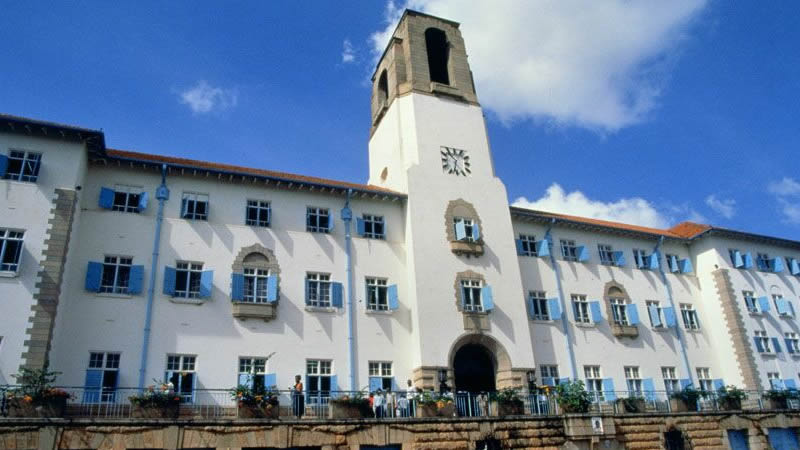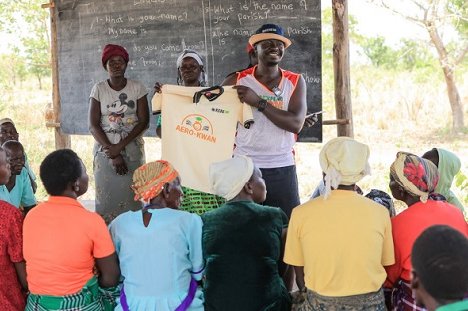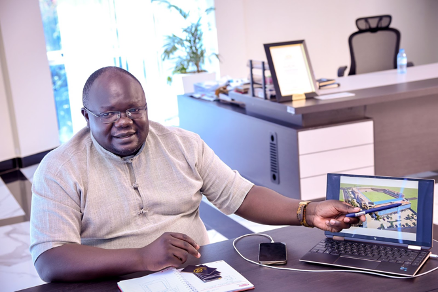By Tuhirirwe Karane
In the tumultuous year of 1980, as Uganda held its collective breath in anticipation of the country's first presidential election in 18 years, a determined young man named Mwesigwa Rukutana, embarked on a journey that would shape his destiny and leave an indelible mark on the nation.
Seeking admission to Makerere University to study law, Rukutana's entrance was marked by an unexpected twist of fate – the university was closed for fumigation. There he was, standing at the university main gate with all his worldly possessions, accompanied by a man he had hired to carry his belongings on a wheelbarrow from the Old Taxi Park.
Undaunted, the young lad sauntered to the nearby Wandegeya Police Station following the advice of the security guards on the only place he could afford to seek shelter that night. On arrival at the station, the unfolding drama took another turn as he was advised to go further to the Central Police Station (CPS) as there was no space left at the station to house him for the night. At this point, the energies of the wheelbarrow pusher had waned and he offered to take him further, only if he was willing to push his belongings. He eventually spent the night at CPS and was ferried to the university by the police truck early the next morning. This humble and dramatic entrance set the stage for his academic pursuit, foreshadowing the tenacity that would define his political journey.
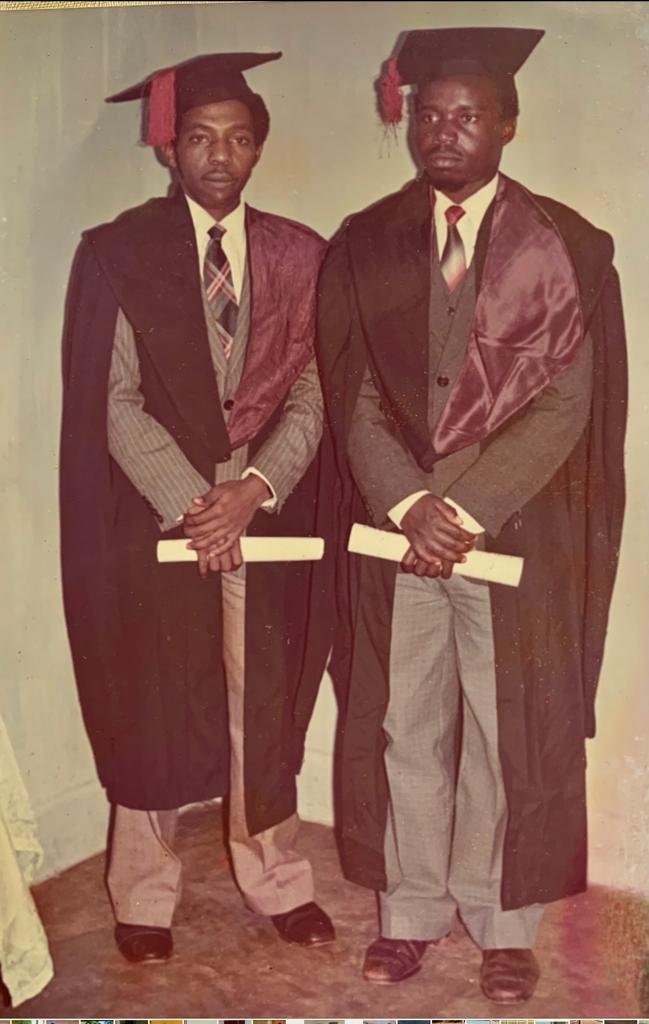
Hon. Mwesigwa Rukutana with a colleague on graduation day
Beaming with lots of nostalgia, Rukutana recounts that University then was a springboard for anyone who wanted to transform his or her life and he was elated to be at Makerere, which had the best quality education in the region and on the continent.
Resilience through parental loss
Having risen from what he refers to as a “less than humble background”, Rukutana found particular excitement in the student stipend of Shs7,000, approximately Shs700,000 in current value every quarter. In addition, “Shs3,000 was given to us for buying reading materials from the canteen, but we knew that the University library was well-stocked so we used the money for business because everything else (accommodation, meals, stationery) were catered for from 1980-1983,” he recounts.
This stipend would later prove pivotal in Rukutana's life, especially during a challenging juncture in his first year at Makerere Law School. Tragically, his father passed away during this period, leaving behind Rukutana, his mother, and 14 siblings grappling with the responsibility of their family's welfare. As the sole member of the family with formal education, the burden fell heavily on his shoulders. This unfortunate occurrence sparked an entrepreneurship fire in his belly, and he immediately dived deep into pit sawing and timber supply, establishing timber sheds in Bwaise and Ndeeba from the savings he had made from the student stipend.
Still at university, he later moved into the charcoal business after realizing how lucrative the timber remains (that he was throwing away) were. “My timber lorry had broken down midway through Ssi forest in Mukono and I encountered a truck of charcoal that gave me a lift to Kampala. I observed the supply chain of this charcoal which had ready markets in Kawempe, Wandegeya and Kalerwe unlike my timber that took weeks without supply. Upon this realization, I started burning charcoal, packed it in sacks and sold it. This was so easy because I already had remains of wood from timber and labor. Eventually, I started dealing in maize, beans and groundnut produce from Kamwenge, and Mubende, and I sold them in Kampala.”
Asked about how he managed to balance his very demanding entrepreneurial pursuits with the taxing nature of law school, Hon. Rukutana asserts that he developed the culture of reading at night and doing some other business during the day, a practice that has stuck with him to date. His university investments were later to pay off when he managed to look after his siblings and build a house for his mother, which he is currently renovating and modifying.
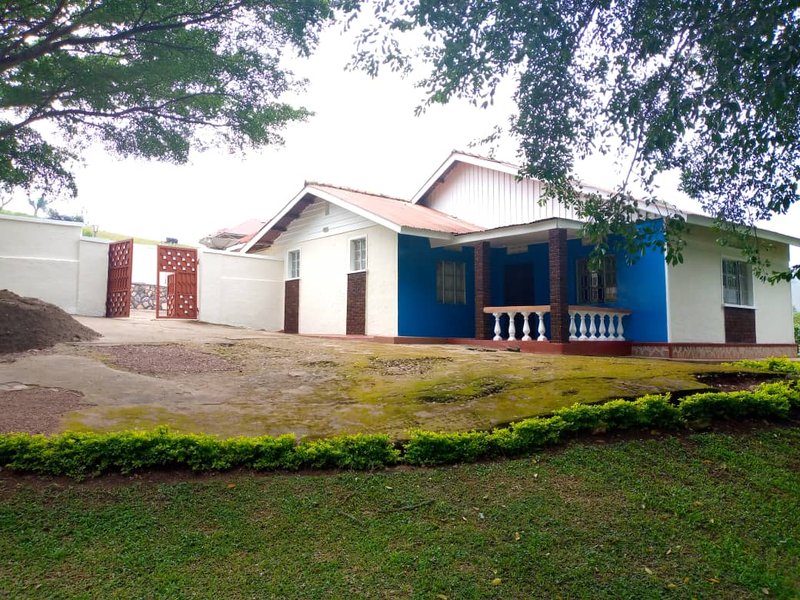
The house Hon. Rukutana built for his mother while at Makerere
Life within the Makerere precincts
After his initial predicament on the reporting day at Makerere, Rukutana quickly settled in at Nkrumah Hall where he had a very memorable experience. One standout moment he vividly recalls is seeing his first television set at his new place of abode.
He was later elected the Secretary of Nkrumah where he made many friends from the Senior Common Room, which increased his appetite for leadership. “I was a staunch supporter of the Uganda People’s Congress (UPC) and my roommate, Henry Matsiko (now the UPDF Chief Political Commissar) supported the Uganda Patriotic Movement (UPM). We mobilized from both ends for our candidates for guild presidency - Sserumaga (UPC), and Opiyo Oloya (DP) - who eventually won, but later fled to exile because of Amin's regime. This was the hottest election I had ever witnessed,” he shares.
Rukutana equally recalls sharing class with the now Chief Justice, Owiny Dollo, who was the best performing student in their class. Other notable people he remembers studying with at Makerere include Justice Lillian Tibatemwa-Ekirikubinza, the former Attorney General William Byaruhanga, Andrew Kasirye, Garuga Musinguzi, Hon. Sam Bitangaro, Hon. Steven Tashobya, Maj Gen. Henry Matsiko and Col. John Kazoora.
During his leisure hours, Rukutana fondly reminisces visiting Katanga frequently, with his friends, reveling in the pleasure of savoring pork and glasses of waragi.
A career in law and politics
After completing his bar course at the Law Development Centre, Rukutana served as the Registrar of Titles in the Ministry of Lands, from 1986 until 1988. He also worked as a lecturer at the Law Development Center, in Kampala for 8 years before plunging into the world of politics.
In 1994, he was elected as a Delegate to the Constituent Assembly that drafted the 1995 Ugandan Constitution, serving in that capacity until 1995. “I participated so heavily in propagating the 1995 Constitution under the legal committee chaired by Rt. Hon. Amama Mbabazi, and I plead guilty for most of the controversial political clauses because I had a hand in them. I do not regret any, only that our expectations while including those clauses are not what we imagined but I proudly associate myself with them,” he states.
In 2001, he was elected to the Ugandan Parliament, to represent Rushenyi County, Ntungamo District, a seat he occupied till 2021. Shortly after his election into Parliament, the president appointed him Minister of State for Finance, where he served until 2006. He shares that this was a challenging time for the country because Uganda was then classified as a highly poor indebted economy. He however took it in stride, and he recalls working together with Keith Muhakanizi, Chris Kassami and many others to put in place the best practice monetary policies, the tough negotiations with the World Bank and IMF, guiding the liberalization of the economy and infrastructure development which boosted foreign direct investment, all of which was under the guidance of President Museveni. He has never forgotten the many sleepless nights at State House but is nevertheless glad that they all paid off.
Another political appointment he remembers fondly is his time as the Minister of State for Higher Education. “There was no single strike in public universities during my reign. I befriended professors and we understood each other. I remember camping at Kyambogo University for two days to harmonize all the issues and the looming strike was then averted.” He also remembers spearheading the initiation of the revolving fund that paved way for the Higher Education Students Loan Scheme.
He is particularly glad for his service to the people of Rushenyi County. He recalls with gratitude that when he joined politics, the whole county did not have a single pole of electricity but through his lobbying, many towns including Rubaare, Kyempene, Rwahi, Rwentobo got connected to the national grid. “I also put in place the “Ngomba Water Project” that is capacitated by the gravitational force and expanded to all the towns,” he adds.
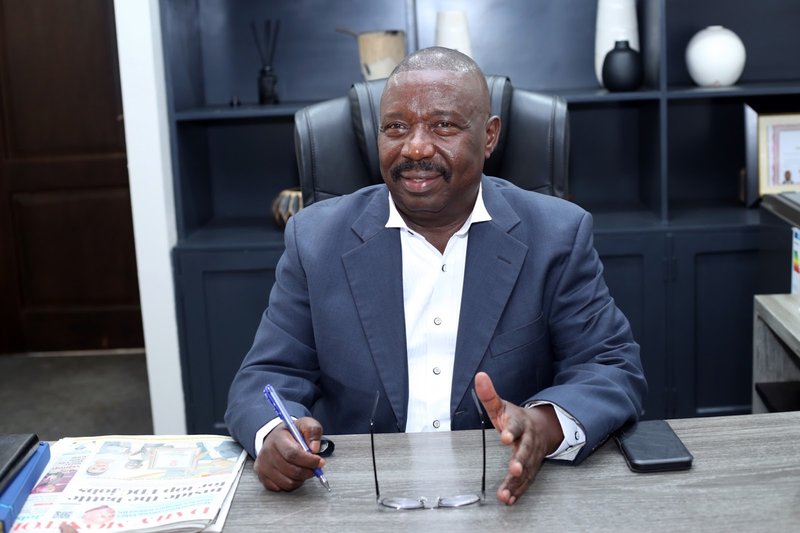
Hon. Rukutana in office at his law firm, Mwesigwa Rukutana & Co. Advocates
Retirement
After life in politics, Rukutana says he has fully embarked on rebuilding his law firm, Mwesigwa Rukutana & Co. Advocates. “Before I joined politics, my law firm was among the best three performing law firms in the country. While serving my country, I did not have time to supervise, and it disintegrated,” he admits.
He adds that, “As the Deputy Attorney General, I was always in court myself for the lawsuits because I had anticipated and prepared to retire while doing what I love most. As we talk, I am retired but working at my law firm and busier than the previous political positions because I arrive at the office at 6:45am and leave at around 5/6pm every weekday.” Besides this, he is managing his investments in hospitality, real estate, and equally does a lot farming.
He urges the current students to study hard while at school and make good social relations because he is what he is because of the friends he made at, and post university. His final bit of advice is that at whatever stage you are, enjoy life because a day that goes by never comes back.
Related News
![]() Please join hands with the Makerere University Endowment Fund as it works towards attracting & retaining the best faculty, providing scholarships, and investing in cutting-edge research and technology.
Please join hands with the Makerere University Endowment Fund as it works towards attracting & retaining the best faculty, providing scholarships, and investing in cutting-edge research and technology.
